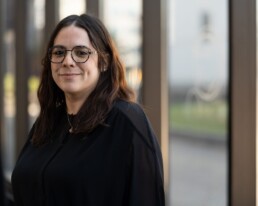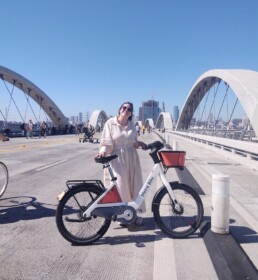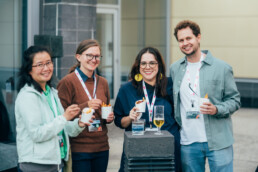Seeing Yourself in a Shared Micromobility Role
To complement NABSA’s Building a Better Shared Micromobility Industry: Best Practices for More Diverse and Inclusive Workplaces toolkit and strategy to increase diversity in the shared micromobility workforce at all levels we launched “Workforce Diversity Wednesdays”. This blog and social media series spotlights jobs in shared micromobility throughout the year. We post interviews with individuals in the shared micromobility industry highlighting their work and role with the hopes of encouraging more diversity and representation in the field.
Meet Gabriela Becerra! Gabriela is the Strategic Communications Coordinator for BKT bici pública, a Mexican company with more than 15 years of experience, that currently operates the two largest bike systems in the country: Ecobici (Mexico City) and MiBici (Guadalajara). Gabriela is a current NABSA board member. Read more and learn about her journey to shared micromobility below:

How did you come to arrive at working in shared micromobility and your current role?
In 2015, I began to work in strategy and communication, focused on politics and in government, but as a student I did research on the cycling movement (2008) in Guadalajara, and made some radio shows on the topic, so I was familiar and passionate about the movement.
In 2020, I joined the BKT communications team, partly because it is a topic that, as a public bike user, I like a lot. I currently coordinate the area and represent BKT as a board member at NABSA.
What is your favorite thing about your job?
I really enjoy seeing the system and its movement in the city: the bikes on the streets, the people commuting on them, the balancing, the branding of the systems in transit stations and on other means of transportation.
But what I really love is seeing how public space transforms. It is a tangible change not only in the daily lives of its users, but also in the city. It’s an exchange in which the systems (the stations and the bikes) generate greater road culture, safety and cycling infrastructure, and this also allows the systems to grow and have more approval in the city.

What has surprised you most about your job?
Personally, as a feminist, I find it impressive to discover that public cycling generates greater autonomy and security in women, which is research I’ve presented at the NABSA conference before. That intersection between feminism and the ownership of public space is just amazing.
At work, it is very satisfying to see how bikeshare (in both cities where we work) is considered public, and how we coordinate with the government to achieve its integration into other means of transportation and how it is seen as a public good.

